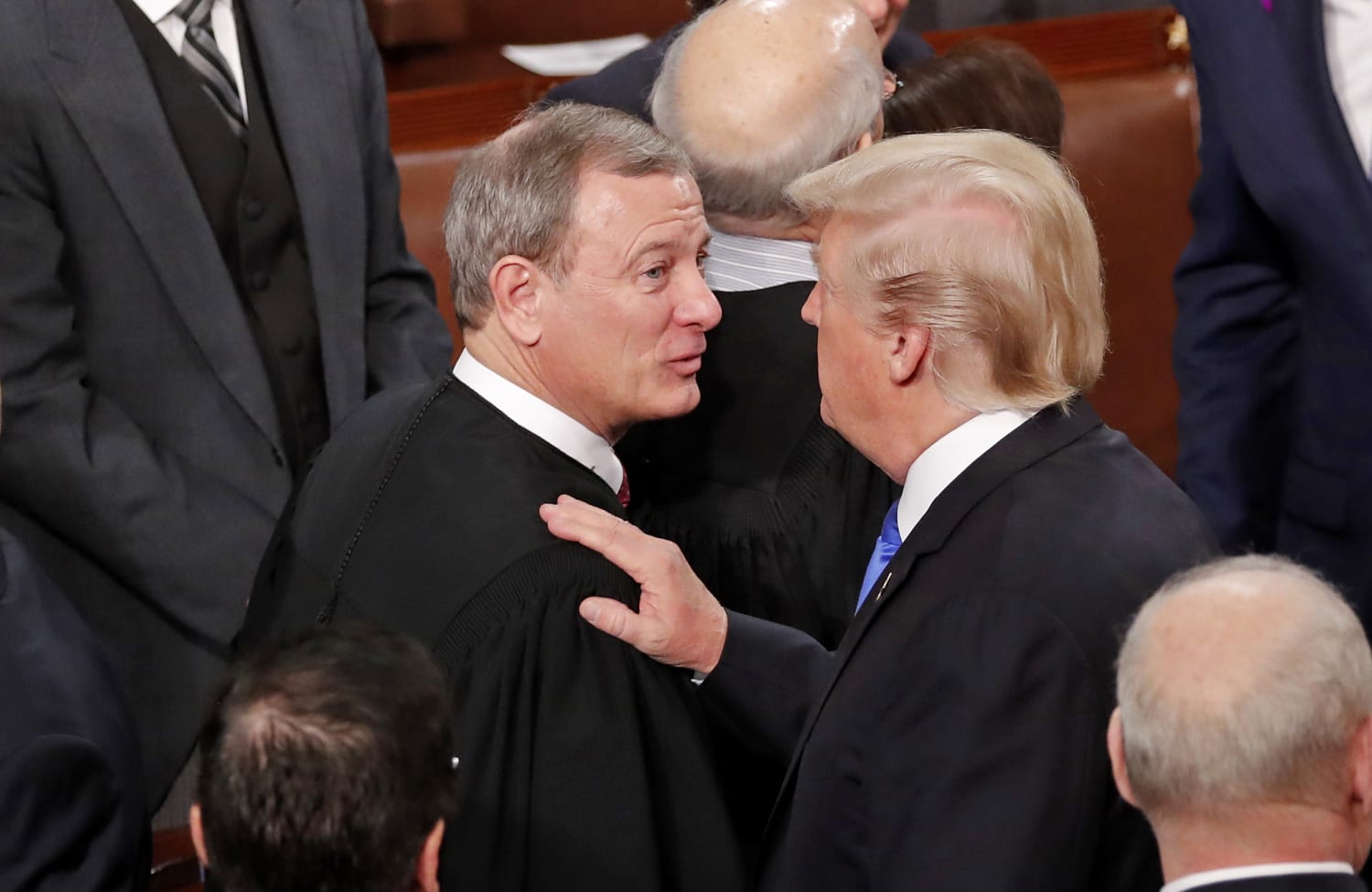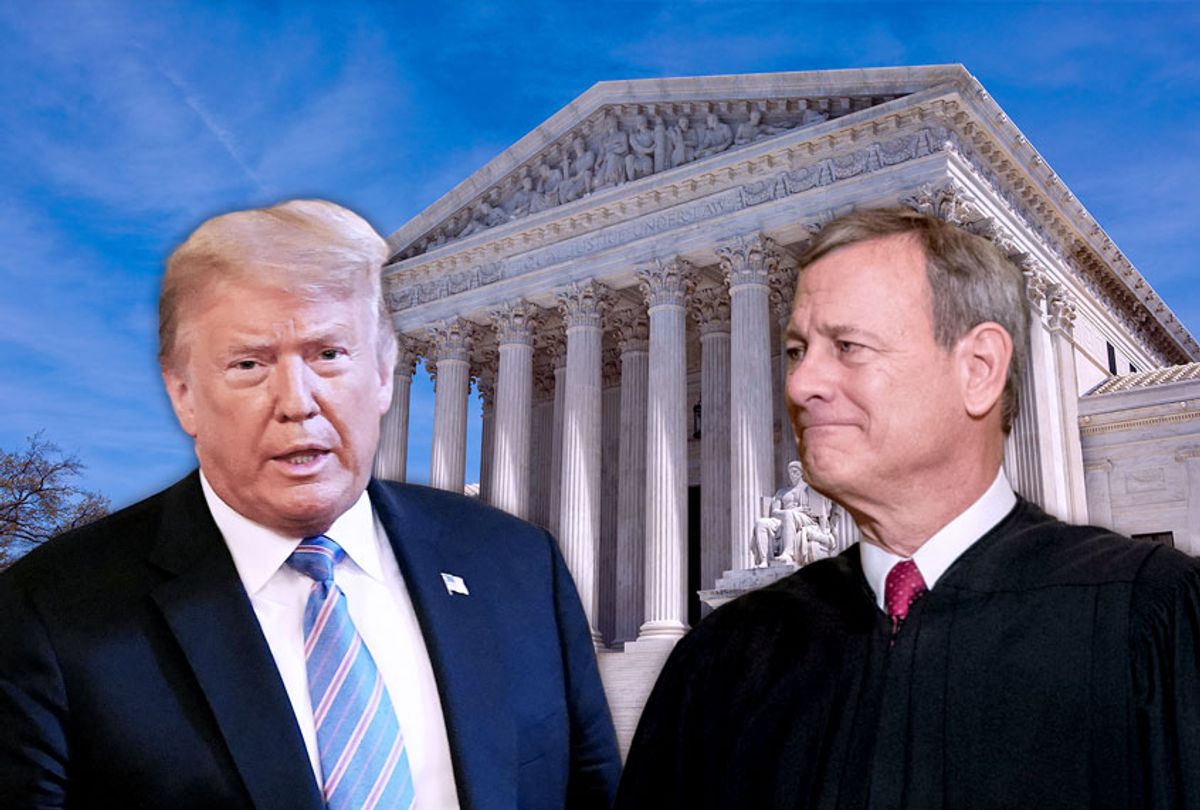The Republican Party is facing an internal struggle as lawmakers grapple with how to respond to former President Donald Trump’s ongoing confrontation with the federal judiciary.
The conflict reached a new height this week when Chief Justice John Roberts issued a rare public rebuke, criticizing Trump’s comments and his attacks on judges who oppose his policies.
The clash between the president and the judiciary has left GOP lawmakers in a precarious position, unsure whether to publicly support Trump’s stance or to distance themselves from his increasingly contentious relationship with the judicial system.
As Trump and his allies intensify their attacks on judges who stand in the way of his political agenda, the Republican Party finds itself divided. While some lawmakers have been vocal in their support of Trump’s fight against judicial overreach, many others are quietly worried about the long-term implications of his actions.
These lawmakers are caught between the need to maintain their political loyalty to Trump and the concern that his aggressive stance could harm the credibility of the judiciary and the separation of powers in American government.
The tension between Trump and the judiciary is not new. Throughout his presidency, Trump often criticized federal judges who issued rulings unfavorable to his administration, from his travel bans to his immigration policies.
However, the current standoff has taken on a more serious tone. In the latest conflict, Trump and his supporters have gone after judges who are slowing or blocking key aspects of his agenda, including his immigration policies.
The most recent flashpoint involves a federal judge who ordered the Trump administration to halt the deportation of several hundred Venezuelans to El Salvador, a move Trump has fiercely opposed.
The decision has sparked outrage among Trump’s allies, who view it as a significant setback to his immigration efforts. In response, Trump has escalated his rhetoric, accusing the judiciary of overstepping its bounds and undermining his authority as president.
This increasingly adversarial relationship has raised alarms among some GOP lawmakers, who are concerned that Trump’s attacks on the judiciary could erode public trust in the legal system and weaken the separation of powers.
The fear is that if the executive branch is allowed to override the judicial branch, it could set a dangerous precedent for future presidents to undermine checks and balances.
The growing rift between Trump and the judiciary has put Republican lawmakers in an uncomfortable position. On one hand, they recognize the importance of supporting the president, especially with the looming threat of primary challenges from Trump’s supporters.
On the other hand, they also understand the potential consequences of allowing Trump to continue undermining the judiciary.
Many Republican officeholders are hesitant to speak out against Trump, fearing that doing so could invite backlash from his loyal base of supporters. In a party where Trump’s influence remains strong, lawmakers are wary of becoming targets for criticism or facing a primary challenge from a more Trump-aligned candidate.
As a result, many Republican lawmakers have remained silent on the issue, hoping that the situation will resolve itself without them having to take a public stance.
However, privately, some GOP lawmakers are growing increasingly concerned about the long-term impact of Trump’s approach to the judiciary.
While they may not openly criticize the president, they worry about the consequences of undermining the judiciary’s independence and the potential harm to the system of checks and balances that has been central to American democracy.
While most Republican lawmakers have kept quiet, a handful have spoken out in support of Trump’s actions. Some have echoed Trump’s criticisms of the judiciary, calling the federal judges who have blocked his policies “activists” or accusing them of overstepping their authority.
These lawmakers argue that Trump’s agenda is in line with the will of the people and that judges who interfere with that agenda are standing in the way of progress.
One of the most vocal supporters of Trump’s battle with the judiciary is Senator Lindsey Graham of South Carolina, who has consistently defended the president’s stance on judicial issues.
Graham has criticized federal judges who block Trump’s policies, accusing them of being biased against the administration and of using their positions to push their own political agendas.
In the House, Republican Representatives Jim Jordan and Matt Gaetz have also been outspoken in their support of Trump’s attacks on the judiciary.

Both have voiced concerns about judicial overreach and have argued that judges who block Trump’s immigration policies are acting outside their constitutional authority. These lawmakers have been among the most vocal in defending the president’s efforts to expand his executive power.
Despite the vocal support from a few Republican lawmakers, the majority of the party has remained silent on the issue. Many Republicans are unwilling to publicly endorse Trump’s attacks on the judiciary, fearing that doing so could alienate moderate voters and damage the party’s reputation.
As the situation drags on, it appears that the GOP is reluctant to take a firm stance, with many lawmakers hoping to avoid controversy and maintain a delicate balance between supporting Trump and protecting the integrity of the judicial system.
The silence from most Republican lawmakers may also reflect the party’s deepening internal divisions. While Trump remains immensely popular among the party’s base, many Republicans are uncomfortable with his confrontational approach to governance.
Some are worried that his actions could hurt the party’s long-term prospects, especially if his attacks on the judiciary continue to escalate.
As Trump’s clash with the judiciary continues, Republican lawmakers are faced with a difficult decision. On one hand, they must maintain their loyalty to the president and his agenda, as his support remains crucial to their political survival.
On the other hand, they must weigh the potential risks of siding with Trump against the long-term damage that could be caused by undermining the independence of the judiciary.
The situation has exposed a rift within the Republican Party, with some lawmakers eager to support Trump’s every move, while others fear the implications of his actions for the future of American democracy.
Whether the party can find a way to navigate this divide and chart a path forward remains to be seen. For now, the GOP remains stuck in the middle of Trump’s battle with the federal judiciary, unsure of how to respond and uncertain about the consequences of taking a stand.
The ongoing conflict between Trump and the federal judiciary is far from over, and it will continue to have a significant impact on the Republican Party. Lawmakers are divided on how to respond, and the tension within the GOP is likely to persist as the party grapples with its future direction.
Whether Trump’s confrontational approach to the judiciary will ultimately help or harm the party remains to be seen, but for now, GOP lawmakers are left navigating a delicate political landscape with no easy answers.









